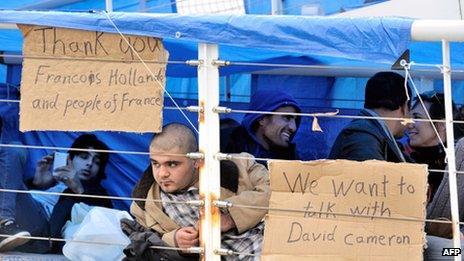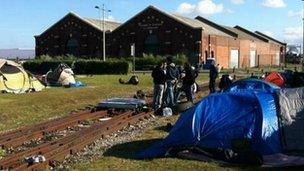Calais's Syrian refugees desperate to cross Channel
- Published

Syrian refugees occupying a ferry footbridge at the port of Calais
Hundreds of Syrians say they are stuck in the French port of Calais waiting to claim asylum in the UK.
Some have staged sit-ins, gone on hunger strike or even threatened to kill themselves if they are not allowed to cross the Channel.
An estimated 2.1 million people have so far fled the fighting in Syria.
The UN says more than 100,000 people have died so far in the civil war, which has been raging for more than two and a half years.
Ahmed and Ali told BBC Radio 5 live why they wanted to come to Britain: "Britain would provide us with shelter. France gives us nothing.
"Britain will give you a house straight away."
When asked how he knew that, Ahmed said: "We know. Our friend is there, lives there, we get phone calls."
Did he know people who have done that already?
"Yeah, a lot of people - they've crossed that border by the lorry."
The deputy mayor of Calais, Philippe Mignonet, speaking to BBC Radio 5 live's Victoria Derbyshire programme, said Britain was a target for Syrian refugees because it was regarded as a "paradise" for people trying to start new lives.

Syrian refugees say they are forced to camp on wasteland
"The only thing they want is not to stay in France but to go to England - it's because of the mafia.
"In their original countries those people are saying if you go to England you will have everything - you will have a house, you will have money, you will have a job, your family will be able to join you. Right or wrong, it is what is said.
"We have now in Europe to understand that and to fight against those mafias."
He says mafia gangs are operating in his town and charge more than £10,000 (11,800 euros) per person to smuggle someone into Europe.
Mr Mignonet called for more support from the EU in dealing with the problem.
Richard Ashworth, the leader of Conservative MEPs, told 5 live: "If the mayor of Calais has evidence of such criminal gangs operating in his jurisdiction he should ensure they are investigated, rooted out and prosecuted will the full force of the law.
"Criminality is criminality wherever it happens."
He added: "What he should not seek to do is pass his problem on to the UK by seeking financial help just because some immigrants in Calais happen to say their intention was to head for Britain."
France is one of 12 countries in Europe that have agreed to offer a limited number of Syrians the right to resettle.
The group in Calais have been told by French officials they would be able to claim asylum in France, with a 95% chance of success. Most, though, still seem determined to cross the Channel and are angry at how they have been treated in France.
Last week, two men threatened to jump from the roof of the Port of Calais departure lounge unless a representative from the British government went to speak to them and granted them refuge in the UK.
They were eventually talked down. They remain in the town and line up daily for food near the port exit.
The European Commission says it expects the number of refugees to increase. About 50,000 have so far asked for protection from European countries, the majority in Germany and Sweden.
Michele Cercone, the commission's home affairs spokesman, has called for other countries to help.
He said: "With a crisis of this magnitude, and the possibility of a prolonged refugee situation, we need to face the situation in the spirit of solidarity. When the pressure is too high on the reception systems of some of our member states, those countries less exposed should be able to step in and support."
A Home Office spokesman told 5 live there were no plans to resettle or provide temporary protection to Syrians entering the UK, and added: "Legal and illegal migration in France is the responsibility of the French authorities."
The British government has promised to pay £500m to the international relief effort for the victims of the civil war, with that money targeted at providing help to Syria's neighbours.
- Published3 September 2013
- Published17 October 2013
- Published11 October 2013